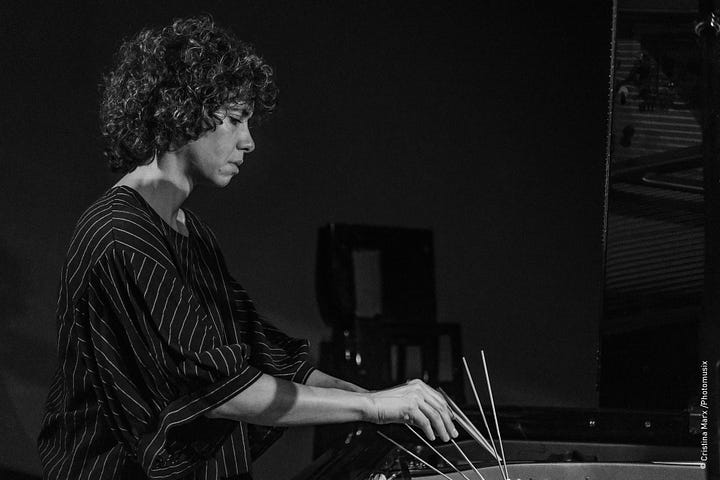Tickle Me Ivory
Keyboards for the Children of Gaza, Rieko Okuda & Mia Dyberg, Jane in Ether, Felix Henkelhausen Quintet
Pianos in Berlin
Pianos for Gaza
Back in March pianist Magda Mayas and multi-instrumentalist Boris Hauf released GAZA: Charity Release for the Children of Gaza on the latter’s long running Shameless Rocks imprint as a digital download. The pair collected 42 tracks featuring 48 players of keyboard-rooted music running nearly four-and-a-half hours by some of the most inventive, storied improvisers at work in Europe, although there are two stray Chicago tracks, a product of Hauf’s ongoing connections to the city, from D Bayne and TV Pow, as well as a pair from Australians Chris Abrahams and Alister Spencer. Among the artists are Christian Wallumrød, Pat Thomas, Lisa Ullén, Marta Warelis, Elisabeth Harnik, Sten Sandell, Steve Beresford, Kaja Draksler, Håvard Wiik, Achim Kaufmann, Kit Downes, and Ingrid Schmolliner. Naturally, the music jumps all over the place; there would be no limiting such a cast of musicians. Proceeds from the project benefit Ghassan Abbu Sittah Children’s Fund, and depressingly, the need for such assistance seems even more dire now than when the collection was released on March 7.


On Wednesday, May 21 a selection of the participants— Ernst Surberg, Harri Sjöström (a saxophonist, of course, who accompanies Harnik on the album), Achim Kaufmann, Andrea Neumann, Anais Tuerlinckx, Volker Meitz, Simon James Phillips, Magda Mayas, Xenia Hauf, and Boris Hauf—will gather at KM28 to belatedly celebrate its release, but I have no doubt the primary ambition is re-engage attention on the situation in Gaza, where hundreds have died in recent days. In such a context it might feel trifling to discuss the music, but it’s actually a remarkable compilation. The obvious motivation for such an endeavor is generating support, which means the content often feels secondary, but thanks to canny curation and the vision of most of the players, this album is impressively consistent qualitatively, whether it’s an improvisation revolving around the sound of an iconic pianist like Thelonious Monk, as on Draksler’s wonderfully fractal “Sphere M,” or the abstract electro-acoustic mayhem harnessed by Ullén on her juddery “yta.” You can hear both of them, below. The collection has a, perhaps, unintended value, as it actually provides a strong survey of some of the most vibrant strands of experimental and improvised keyboard music today, with a disparate array of prepared piano practitioners, sound-oriented explorers, and distantly jazz-adjacent players, along with all manner of shifting admixtures of the three, frequently providing high-grade work. There are also a variety of organ and electronic keyboards present, but acoustic piano dominates. I’m pretty sure such aesthetic sharpness wasn’t accidental, but Mayas and Hauf are both deeply committed activists; one facet doesn’t come without the other. Concert attendees will be given a download code for the album.
Piano with Alto Saxophone
Rieko Okuda is one of the other participants on the Gaza benefit album, but she’s performing elsewhere that evening, celebrating a new duo album with alto saxophonist Mia Dyberg at Sowieso. Both musicians are crucial figures on the Berlin scene, actively participating in countless ad hoc improv sessions as well as playing in a variety of working ensembles. In fact, it’s hard to keep up on the merry-go-round of projects each is involved in, but I’m especially partial to the pianist’s role in Banquet of Consequences, the rambunctious but sophisticated sextet led by bassist Antonio Borghini, while Dyberg’s various constellations include a superb trio, with fellow Danish musicians Asger Thomsen (double bass) and Simon Forchhammer (drums), that released the strong Timestretch (Clean Feed) in 2023, but, to the best of my knowledge, has yet to play a subsequent show in Berlin. I actually wasn’t aware that the Okuda-Dyberg duo has been a long-running concern, with two previous albums under its belt, but I’ve been digging into Glasscut, their third album together, and the debut offering from a new Berlin imprint called Kassiani Records operated by Alessandro Onori, the ardent music fan behind the No Room For Squares listening sessions.
It's unfortunate that these musicians haven’t achieved greater notoriety in and outside of Berlin, and the new recording reveals some strong ideas, using an improvised format to present complex interactions. Their language is rooted in jazz, but structurally they simultaneously hold on to and push conventions aside. On the opening track “Jikan,” the first four-and-a-half minutes of which you can hear below, Dyberg unleashes some probing post-bop sallies, toggling between a distinctive Ornette-ish bite and more abstract flurries of sound, including some extended silences injecting a fraught tension into her elliptical blowing. It’s nearly two minutes before Okuda plays a single note, but when she enters it almost feels as if she has been improvising all along. In retrospect, Dyberg’s solo opening feels like half of a dialogue in which we can’t hear the other part of the conversation. That sort of interactive quality distinguishes the entire piece, whether both musicians are making sound or not. My guess is that such an effect is serendipitous, perhaps existing only in my own brain, but I find the negotiation fascinating either way, especially when Okuda and Dyberg ease away from a jazz sound toward something more oblique and contemplative. In fact, the whole album—which was recorded at the Kuhlspot Social Club this past October—feels less explicitly “jazzy” than what the duo was previously released, but the rapport and interplay remains as adroit, if not telepathic, as before. The album is released digitally the day of the performance—which will also include a solo acoustic guitar set by Olaf Rupp—with a limited vinyl edition to follow in early July.
Piano (and Violin, Voice, and Recorder) Transformed
I was seriously impressed by Spoken / Unspoken, the 2021 debut album by the Berlin trio Jane in Ether, which includes Mayas along with violinist Biliana Voutchkova and recorder player Miako Klein, but the trio’s fantastic follow-up Oneiric (released, like its predecessor, by Mark Wastell’s Confront Recordings) proves what can happen when a group develops it sound over time, slowly congealing into an approach where its components are increasingly elusive. Once again the music is all improvised, but for the most part this new release digs deeper into a unified approach to sustained sound than the debut. To be sure, there are passages when the three instrumentalists carve out distinct areas of interrogation, improvising as three voices meticulously weaving their output together, such as the opening moments of “soaring” where Mayas produces a carpet of percussive resonance both directly upon the piano’s strings and mediated through objects, Klein blows unpitched breaths in alliterative spams, and Voutchkova weds vocal fry, wordless meandering, and delicate, weightless bowed violin tones, but the bulk of the record almost feels compositional in terms of how cohesive the individual transmissions operate as one.
For me the undeniable highlight of the new album is the title piece, a nineteen-minute excursion where the component sounds meld wondrously into a tactile, ever-shifting meditation marbled with endless textural variation and harmonic movement. Taste is personal, of course, but these days the improvised music that routinely speaks loudest to me is when musicians achieve this kind of spontaneous sonic marriage, working collectively, and subsuming individualities in pursuit of a massed ensemble sound in which each particular element exists to serve the whole. Of course, this approach isn’t new and we could look back to AMM as one potential starting point, but I feel like this approach has achieved a critical mass of late. This sort of pursuit actually feels far more non-idiomatic than any of the improvisation that once claimed that mantle. “Oneiric,” which you can hear below, continues to pull me and transport me to some hypnotic zone where I marvel at the way the variegated voices align into one without surrendering all of that rich, internal detail. My listening takes me in and out of awareness of who is doing what—sometimes I can’t figure it out at all, which is wonderful—and it registers as a profound expression, an area where the musicians come together in some ineffable place as instinct and intimacy with pure sound becomes the guiding consciousness. Jane in Ether celebrate the release of the new album with a performance at Sowieso on Saturday, May 24.
Felix Henkelhausen’s New Groove
While bassist Felix Henkelhausen has been duly celebrated for his role as a rhythmic and harmonic anchor in a growing number of bands—including Jim & the Schrimps, Fare, and Stefan Schultz Large Ensemble—he’s been increasingly flexing his muscles as a bandleader and composer. I had the privilege to write the liner note essay for his rigorous 2024 album Deranged Particles, where his sonic invention and multi-partite writing achieved an impressive apotheosis, he’s also been expertly guiding his working quintet into heighted interplay. That group—with saxophonists Wanja Slavin and Uli Kempendorff, drummer Leif Berger, and pianist Elias Stemeseder—released Misanthropic Tendencies, its debut album back, in 2021, and as much as I liked its ambition and technical flair, in hindsight it sounds a bit stiff and calculated. My opinion has changed largely because of the group’s follow-up, a bracing collection of live performances, with a fresh repertoire, recorded in Berlin and Cologne in 2023 with new keyboardist Valentin Gerhardus replacing Stemeseder. As I wrote above about Jane in Ether, a good working band grows over time, and that’s certainly the case with the music on The Excruciating Pain of Boredom, which seethes with energy, precision, and rhythmic snap.

Henkelhausen and Berger are a killer rhythm section—agile, strong, and able to redirect on a dime—and they sound both infinitely more connected and locked-in, while also demonstrating an ease that wasn’t so apparent on the debut. Showing off that ease on such tricky, twisting compositions is no mean feat, but admiring their technical mastery comes as an afterthought because it all feels so natural, even when the band is swinging at breakneck tempo. From the beginning I loved the dynamic and blend that Slavin and Kempendorff produce. While their tonal worlds aren’t in conflict, the former works often in contexts reflective of pop and R&B while the latter is a hardcore student of post-bop sophisticaiton, but the way they navigate these tunes together, pushing-and-pulling at one moment, caressing and curving together at the next, is exhilarating, and it also renders their aesthetic differences moot in this context. Apart from his authoritative piano playing Gerhardus adds a new wrinkle to the band via live electronics, smudging harmonies and dropping a kind of aural scrim over the proceedings that only adds tension. Below you can check out “Cycle (Part II).” The group performs at Piano Salon Christophori on Thursday, May 22, following several earlier tour dates, so I expect them to generate some serious heat.
Recommended Shows in Berlin This Week
May 20: Mekons, 10:30 PM, Quasimodo, Kantstraße 12a, 10623 Berlin
May 21: Six Organs of Admittance, 8 PM, Petersburg Art Space, Kaiserin-Augusta-Allee 101, 10553 Berlin, entrance in the courtyard, Aufgang II, 1 OG
May 21: Ernst Surberg, Harri Sjöström, Achim Kaufmann, Andrea Neumann, Anais Tuerlinckx, Volker Meitz, Simon James Phillips, Magda Mayas, Xenia Hauf, and Boris Hauf, various keyboards, release concert for GAZA compilation, 8:30 PM, KM28, Karl Marx Straße 28, 12043 Berlin
May 21: Peter Ehwald, saxophone, Johannes Fink, cello, Isabel Rößler, double bass, and Klaus Kugel, drums, 8 PM, Panda Theater, Knaackstraße 97, (i.d. Kulturbrauerei, Gebäude 8) 10435, Berlin
May 21: Rieko Okuda, piano, and Mia Dyberg, alto saxophone; Olaf Rupp, acoustic guitar, 8:30 PM, Sowieso, Weisestraße 24, 12049 Berlin
May 22: Nap Eyes; Naive Set, 8 PM, Schokoladen, Ackerstraße 169, 10115 Berlin
May 22: Six Organs of Admittance, 8 PM, Petersburg Art Space, Kaiserin-Augusta-Allee 101, 10553 Berlin, entrance in the courtyard, Aufgang II, 1 OG
May 22: Felix Henkelhausen Quintet (Wanja Slavin, alto saxophone, Uli Kempendorff, tenor saxophone, Valentin Gerhardus, piano, electronics, Leif Berger, drums, and
Felix Henkelhausen, double bass), 8 PM, Piano Salon Christophori, Uferhallen, Uferstr. 8, 13357 Berlin
May 22: Marie Krüttli Trio (Marie Krüttli, piano, Lukas Traxel, double bass, and Gautier Garrigue, drums), 8:30 PM, Sowieso, Weisestraße 24, 12049 Berlin
May 23: Splitter Orchestra and Yuko Kaseki, 8 PM, Kulturraum Zwingli-Kirche, Rudolfstr. 14 10245 Berlin
May 23: Edoardo Marraffa, tenor saxophone, Olaf Rupp, electric guitar, Matthias Bauer, double bass, and Rudi Fischerlehner, drums, 8:30 PM, Sowieso, Weisestraße 24, 12049 Berlin
May 24: Jane in Ether (Miako Klein, recorders, Magda Mayas, piano, and Biliana Voutchkova, violin, voice), 8:30 PM, Sowieso, Weisestraße 24, 12049 Berlin
May 25: Anna Clementi, voice, and ensemble mosaik play Aldo Clementi, 8 PM, Acker Stadt Palast, Ackerstraße 169, 10115 Berlin
May 25: Schlippenbach-Waldorff Quartet (Alex von Schlippenbach, piano, Henrik Walsdorff, alto saxophone, Antonio Borghini, double bass, and Jan Leipnitz, drums), 9 PM, B-Flat, Dircksenstr. 40, 10178 Berlin
May 26: Edoardo Marraffa, tenor saxophone, Olaf Rupp, electric guitar, Matthias Bauer, double bass, and Rudi Fischerlehner, drums, 8:30 PM, Kühlspot Social Club, Lehderstrasse 74-79, 13086 Berlin





